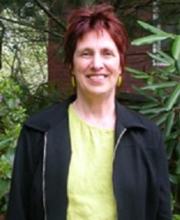Julie Graham
Research Interests
Julie Graham 1945-2010
Julie Graham’s profound intellectual contribution was to offer hope in a deeply flawed world. This hope inspired students, national and international colleagues, and community organizers around the globe. Together with her collaborator Katherine Gibson she developed what they came to call a post-capitalist politics: a politics in which the many economic systems and relationships that are different from capitalist exploitation are noticed, made visible, supported, and encouraged. Once taught to notice this rich complexity, Julie’s students and colleagues began to see possibility and diversity all around them. The role of the academic became not only to critique and analyze, but also to pursue and support possibility. Julie’s life and work were about hope, possibility and caring; what made her so influential was that she tied this to sharp theoretical insight.
Julie came into the Department of Geosciences at the University of Massachusetts Amherst as an Assistant Professor in economic geography in 1984, becoming Associate Professor in 1991, Full Professor in 1998, and serving as Associate Department Head for Geography between 1999 and 2006. At UMass, she also served on many committees for students in Economics, Women’s Studies, Labor Studies, Education, Political Science, and Anthropology. Julie worked closely for many years with Professor Richard Wolff and the late Professor Stephen Resnick in the UMass Economics department, publishing two volumes of edited essays with them. She was a member of the Editorial Board and Advisory Board of the journal Rethinking Marxism. Over the course of her career, at various times, Julie held visiting academic positions at NYU, the University of Oregon, Rutgers University, and in Australia, Monash University, the Australian National University, and the University of Western Sydney.
Her scholarly achievements included more than fifty publications with co-author Katherine Gibson under the blended pen name J.K. Gibson-Graham. Gibson-Graham published two major books: The End of Capitalism (As We Knew It): A Feminist Critique of Political Economy (1996), which challenged the conventional understanding of capitalism as necessarily and naturally dominant, and was named a “Classic in Human Geography” in 2009 by the journal Progress in Human Geography; and A Postcapitalist Politics (2006) which reports on efforts to perform alternative economies through action research in Massachusetts, Australia, and the Philippines. The book Take Back the Economy: An Ethical Guide for Transforming Our Communities co-authored by J.K. Gibson-Graham, Jenny Cameron and Stephen Healy was begun before Julie died and published in 2013.
Julie Graham was a dear friend and colleague, a powerhouse of intellect, an inspiration in her battle with physical adversity, a humanist who cared about the victims of mindless capitalism and market forces, and a kind, funny, upbeat presence wherever she happened to be. Her colleagues, close friends, and students miss her greatly.


![[cover image]](/sites/default/files/styles/thumbnail/public/2017-11/images.jpeg?itok=9zYMNOcD)